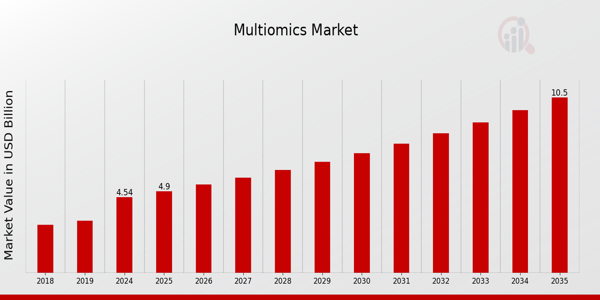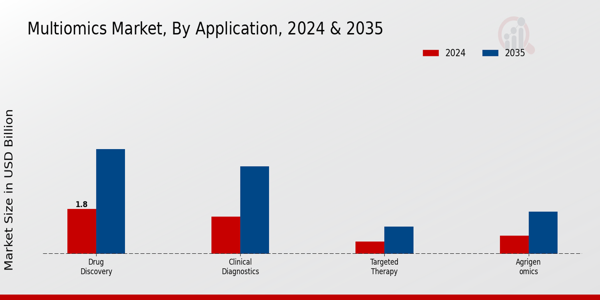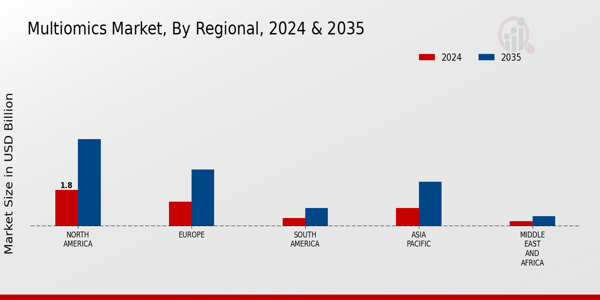Multiomics Market Overview
As per MRFR analysis, the Multiomics Market Size was estimated at 4.21 (USD Billion) in 2023. The Multiomics Market is expected to grow from 4.54 (USD Billion) in 2024 to 10.5 (USD Billion) by 2035. The Multiomics Market CAGR (growth rate) is expected to be around 7.92% during the forecast period (2025 - 2035)
Key Multiomics Market Trends Highlighted
The integration of many omics technologies, including proteomics, metabolomics, and genomics, is driving a more comprehensive knowledge of biological systems and is driving a boom in the Multiomics Market.Advanced biological research and a greater knowledge of illness are made possible by this all-encompassing approach, especially in fields like medication development and customized treatment.Research organizations are being pushed to implement multiomic methodologies by the growing attempts to decode complex illnesses, which will improve the capacity to find biomarkers and therapeutic targets globally.
Furthermore, governments and healthcare organizations throughout the world are emphasizing the need for customized treatment alternatives, which is driving the market for precision medicine. The expansion of this business is also associated with efforts to promote financing possibilities and research partnerships.Significant possibilities are being created for both technology providers and research institutions by the application of artificial intelligence and machine learning in data analysis, which is opening up ways to improve the effectiveness and precision of multiomics research.
Using multiomics data for public health surveillance and to address new health hazards throughout the world has become more popular in recent years. Real-time health monitoring is possible when multiomics and data science are combined, especially in epidemic response.Additionally, as governments support unrestricted access to omics data, organizations and researchers may look into collaborations to better utilize these insights, promoting innovation across a range of industries, including clinical diagnostics, pharmaceuticals, and agriculture.It is anticipated that this cooperative setting would accelerate development and promote breakthroughs in the field of multiomics worldwide.

Source: Primary Research, Secondary Research, Market Research Future Database and Analyst Review
Multiomics Market Drivers
Growing Demand for Personalized Medicine
The Multiomics Market is significantly driven by the increasing demand for personalized medicine. With a growing understanding of individual genetic makeup and various biological factors, healthcare systems are leaning towards tailored treatment plans.
According to the World Health Organization, personalized medicine is projected to improve patient outcomes by approximately 30% through individualized therapies. This growing need has prompted major pharmaceutical companies like Roche and Novartis to invest heavily in Research and Development for personalized treatment solutions, often leveraging multiomics approaches.
The integration of data derived from genomics, proteomics, and metabolomics enhances drug development efficiency and accuracy, making it a vital component of modern healthcare strategies globally. This scenario is supported by government initiatives in several countries, aiming to improve patient care through personalized medicine, further boosting the Multiomics Market.
Advancements in Technological Innovations
Technological advancements in sequencing and bioinformatics are key drivers for the growth of the Multiomics Market. Recent innovations have resulted in the reduction of sequencing costs by nearly 90% over the past decade, making multiomics studies more accessible for researchers and clinical applications.
Companies like Illumina and Thermo Fisher Scientific are prominent players who continue to innovate in the field of sequencing technologies, pushing the boundaries of data analysis capabilities.As computational methods improve and the tools for integrating multi-omics data evolve, researchers can derive more valuable insights from biological data, driving further investment and interest globally in multiomics applications.
Increasing Prevalence of Chronic Diseases
The rise in the prevalence of chronic diseases such as cancer, diabetes, and cardiovascular disorders is significantly influencing the Multiomics Market. According to the Global Burden of Disease Study, chronic diseases accounted for about 71% of global deaths in recent years, highlighting the urgent need for innovative diagnostic and therapeutic strategies.
Organizations like the American Heart Association and the National Cancer Institute are increasingly recognizing the role of multiomics in uncovering the underlying mechanisms of these diseases.Research initiatives employing multiomics are finding correlations that may lead to better disease prevention and management, propelling the market forward as governments push for improved health outcomes globally.
Increased Research Funding and Investment
There is a notable increase in research funding and investment aimed at advancing the Multiomics Market. Governments and private sectors worldwide are investing significantly in health and biological research, with funding for multiomics projects growing at an annual rate of around 8% in recent years.Notably, initiatives like the National Institutes of Health's Precision Medicine Initiative underline a long-term commitment to advancing multiomics research.
This financial backing not only accelerates technological advancements but also fosters collaborative efforts among academic institutions, industry leaders, and government agencies, driving innovation in multiomics research strategies, which in turn enhances market growth prospects on a global scale.
Multiomics Market Segment Insights
Multiomics Market Application Insights
The Multiomics Market was poised for significant growth within its Application segment, which included vital areas such as Drug Discovery, Clinical Diagnostics, Agrigenomics, and Targeted Therapy. The Application segment played a crucial role in this upward trajectory.In this segment, Drug Discovery was a major player, valued at 1.8 USD Billion in 2024, and is expected to grow to 4.2 USD Billion by 2035.
This area held significant importance as it revolved around innovative approaches to drug development, leveraging multiomics data to enable targeted treatments and personalized medicine strategies, thus revolutionizing how therapeutic agents are discovered and refined.
Clinical Diagnostics followed closely, with a valuation of 1.5 USD Billion in 2024, anticipated to rise to 3.5 USD Billion by 2035. The use of multiomics in diagnostics served to improve accuracy and efficacy in disease detection and monitoring, demonstrating an important shift toward personalized healthcare solutions.
Furthermore, Agrigenomics, valued at 0.74 USD Billion in 2024 and projected to reach 1.7 USD Billion by 2035, represents a growing interest in agricultural applications of genomic knowledge. This area focused on improving crop yields and resistance through advanced genetic insights, addressing food security concerns on a global scale.
Targeted Therapy, although smaller, valued at 0.5 USD Billion in 2024 and heading toward 1.1 USD Billion by 2035, gained traction as treatments increasingly aim for specificity in targeting disease pathways, particularly in oncology, where multiomics approaches can lead to precision medicine tailored to individual patient profiles.
The collective insights from these application areas illustrated that the Multiomics Market was not only expanding in terms of revenue but also evolving in terms of its impact on various sectors, from pharmaceuticals to agriculture, paving the way for innovative solutions and discoveries that were increasingly essential in a global context.As the market grows, these applications stood at the forefront, driving the momentum of multiomics and solidifying its role in modern science and health.

Source: Primary Research, Secondary Research, Market Research Future Database and Analyst Review
Multiomics Market Type Insights
The segment is crucial as it encompasses various fields of study, enhancing the understanding of biological systems through an integrative approach. Genomics focuses on the comprehensive analysis of genes and their functions, which has been increasingly vital in personalized medicine.
Transcriptomics, on the other hand, studies the complete set of RNA transcripts, providing insights into gene activity and regulation, which is essential for understanding disease mechanisms. Proteomics involves large-scale studies of proteins, and as proteins are fundamental to many biological processes, this area is significant for drug discovery and development.
Lastly, metabolomics examines cellular metabolites, offering a dynamic perspective on metabolic changes and potential therapeutic targets. Each component of this segment not only contributes to the Multiomics Market revenue but also addresses critical research questions, thereby driving growth opportunities across the healthcare and pharmaceutical industries.
The overall market growth is propelled by increasing investments in research and development, advancements in technologies, and a rising demand for personalized medicine.
Multiomics Market End-use Insights
The End-use segment plays a crucial role in this expansion, showcasing the diverse applications of multiomics across various fields. Pharmaceutical companies greatly utilize multiomics to streamline drug discovery and development processes, enhancing efficiency and targeting precision medicine.
Academic and Research Institutes leverage these technologies for comprehensive research initiatives, thereby playing a pivotal part in advancing scientific knowledge. Furthermore, Contract Research Organizations provide essential services that enable pharmaceutical and biotech companies to outsource research and development, significantly impacting the market dynamics.
The growing demand for personalized medicine, coupled with significant advancements in technology, drives market growth. However, challenges such as high costs and data management complexities may impact adoption rates.The Multiomics Market statistics illustrate a robust landscape, with increased funding and collaborative initiatives fueling innovation in this sector. As a result, the diversity of End-users highlights the potential for multiomics to revolutionize healthcare solutions worldwide.
Multiomics Market Technology Insights
The Multiomics Market, particularly focusing on the Technology segment, is poised for substantial growth. This segment showcases a variety of advanced technologies, including Next-Generation Sequencing (NGS), Microarrays, Mass Spectrometry, and Chromatography, each playing a pivotal role in the market's overall dynamics.
NGS is gaining momentum due to its high-throughput capabilities, enabling large-scale genomic studies that drive research in areas like personalized medicine and oncology. Microarrays continue to serve as crucial tools for gene expression profiling, while Mass Spectrometry is essential for proteomics, metabolomics, and the detailed analysis of biomolecules.Chromatography remains significant for separating compounds, providing critical analytical support across various scientific domains.
The Multiomics Market data indicates that these technologies stimulate market growth through innovative applications in health, environmental science, and pharmaceuticals, thus attracting substantial investments and fostering further advancements in research and development initiatives.These factors collectively inform the Multiomics Market statistics, illustrating a landscape ripe with opportunities and continuous evolution in the industry.
Multiomics Market Regional Insights
The Regional segmentation of the Multiomics Market showcased a diverse landscape with varying growth dynamics across different areas. In 2024, North America held a significant value of 1.8 USD Billion, expected to grow to 4.3 USD Billion by 2035, marking it as a dominant player contributing majority holding in the market due to advanced research and development initiatives.Europe followed, with a market valuation of 1.2 USD Billion in 2024, projected to rise to 2.8 USD Billion, driven by its robust healthcare infrastructure and innovative technologies.
The Asia Pacific region, valued at 0.9 USD Billion in 2024 and forecasted to reach 2.2 USD Billion, witnessed rapid growth fueled by increasing investments in biotechnology and genomics.
South America and the Middle East and Africa, although smaller markets with valuations of 0.4 USD Billion and 0.24 USD Billion respectively in 2024, had significant potential for expansion owing to growing healthcare needs and improving regulatory frameworks.This segmentation insight illustrated the diverse nature of the Multiomics Market, with varying growth potential and strategic importance attributed to each region.

Source: Primary Research, Secondary Research, Market Research Future Database and Analyst Review
Multiomics Market Key Players and Competitive Insights
The Multiomics Market has emerged as a pivotal sector within the broader field of healthcare and biotechnology, and its competitive landscape is characterized by rapid innovation and strategic partnerships.This market encompasses the integration of various omics disciplines, including genomics, proteomics, metabolomics, and transcriptomics, aimed at facilitating a comprehensive understanding of biological systems. Companies in this sector are increasingly focusing on developing technologies and platforms that enable high-throughput data analysis and personalized medicine approaches.
Competitive dynamics are shaped by factors such as research and development investments, technological advancements, regulatory frameworks, and collaborations that enhance capabilities in diagnostics and therapeutics.As the demand for precision medicine grows, players in the multiomics market are vying to establish themselves through unique product offerings and robust service frameworks.Focusing specifically on Novartis, the company has a significant presence in the Multiomics Market, leveraging its extensive expertise in innovative healthcare solutions. Novartis is recognized for its strong commitment to research and development, enabling the company to continuously enhance its multiomics capabilities through advanced technologies.
The company's proficiency in genomics and targeted therapies allows it to harness multiomics approaches for personalized medicine, thereby addressing unmet medical needs. Novartis collaborates with various academic institutions and research organizations globally to stay ahead in the competitive landscape, thus enriching its research pipeline.The company's track record of successfully integrating multiomics data into its drug discovery and development processes distinguishes it as a leader in precision health initiatives, allowing for tailored treatment plans based on comprehensive patient profiles.
Merck Group presents a notable force in the Multiomics Market, highlighted by its robust portfolio of products and services that cater to various aspects of multiomics research. The company's offerings include high-quality reagents, analytical instruments, and software solutions that effectively facilitate omics research.
Merck Group's strengths lie in its commitment to continuous innovation and its strategic investments in advanced technologies that foster growth in this market. The company has established partnerships with academic institutions and biopharmaceutical firms to enhance its research capabilities.
Additionally, Merck Group demonstrates its strategic vision through various mergers and acquisitions that bolster its product offerings and market presence. By focusing on operational efficiency and customer-centric solutions, Merck Group is well-positioned to capitalize on emerging trends within the multiomics landscape, subsequently expanding its influence within the global healthcare ecosystem.
Key Companies in the Multiomics Market Include
- Novartis
- Merck Group
- Thermo Fisher Scientific
- Grail
- Horizon Discovery
- Agilent Technologies
- Celerion
- Genomatix
- Pacific Biosciences
- Qiagen
- Roche
- Illumina
- Bristol Myers Squibb
- HoffmannLa Roche
- BioRad Laboratories
Multiomics Market Developments
With the release of their Visium HD platform in May 2024, Illumina improved spatial transcriptomics by fusing high-definition protein and RNA analysis with in-depth tissue mapping. In collaboration with a biotech firm, Thermo Fisher Scientific unveiled a new cloud-native multiomics platform in June 2024 that offers integrated workflows for proteomics, metabolomics, and genomes.The QIAseq Multimodal DNA/RNA Library Kit, which QIAGEN introduced in February 2024, allows for the simultaneous production of DNA and RNA for sequencing and target enrichment from a single sample.
Parabricks v4.3, which incorporates generative AI for quick analysis of various omics data types, such as DNA, RNA, methylation, single-cell, and spatial omics workloads, was introduced by NVIDIA in March 2024.
Researchers may now see gene and protein expression in tissue context thanks to NanoString Technologies' CosMx Spatial Molecular Imager and AtoMx Spatial Informatics Platform, which were added to its spatial multiomics capabilities in April 2023.India's Cancer Genome Atlas (ICGA), which maps the genomic, transcriptomic, and proteomic features of various tumor samples for public research, launched the nation's first complete cancer multiomics data portal in September 2024These advancements from QIAGEN, NVIDIA, NanoString, Thermo Fisher Scientific, Illumina, and India's ICGA demonstrate the continuous platform integration and technical innovation in the worldwide multiomics industry.
Multiomics Market Segmentation Insights
Multiomics Market Application Outlook
- Drug Discovery
- Clinical Diagnostics
- Agrigenomics
- Targeted Therapy
Multiomics Market Type Outlook
- Genomics
- Transcriptomics
- Proteomics
- Metabolomics
Multiomics Market End-use Outlook
- Pharmaceutical Companies
- Academic and Research Institutes
- Contract Research Organizations
Multiomics Market Technology Outlook
- NGS
- Microarrays
- Mass Spectrometry
- Chromatography
Multiomics Market Regional Outlook
- North America
- Europe
- South America
- Asia Pacific
- Middle East and Africa
|
Report Attribute/Metric
|
Details
|
|
Market Size 2023
|
4.21(USD Billion)
|
|
Market Size 2024
|
4.54(USD Billion)
|
|
Market Size 2035
|
10.5(USD Billion)
|
|
Compound Annual Growth Rate (CAGR)
|
7.92% (2025 - 2035)
|
|
Report Coverage
|
Revenue Forecast, Competitive Landscape, Growth Factors, and Trends
|
|
Base Year
|
2024
|
|
Market Forecast Period
|
2025 - 2035
|
|
Historical Data
|
2019 - 2024
|
|
Market Forecast Units
|
USD Billion
|
|
Key Companies Profiled
|
Novartis, Merck Group, Thermo Fisher Scientific, Grail, Horizon Discovery, Agilent Technologies, Celerion, Genomatix, Pacific Biosciences, Qiagen, Roche, Illumina, Bristol Myers Squibb, F. HoffmannLa Roche, BioRad Laboratories
|
|
Segments Covered
|
Application, Type, End-use, Technology, Regional
|
|
Key Market Opportunities
|
Integration of AI technologies, Rising demand for personalized medicine, Expansion in research funding, Advancements in data analytics tools, Growing awareness of disease prevention
|
|
Key Market Dynamics
|
Technological advancements, Rising prevalence of diseases, Increasing research funding, Growing personalized medicine, Demand for efficient drug discovery
|
|
Countries Covered
|
North America, Europe, APAC, South America, MEA
|
Frequently Asked Questions (FAQ):
The Multiomics Market was valued at 4.54 billion USD in 2024.
By 2035, the Multiomics Market is projected to reach 10.5 billion USD.
The expected CAGR for the Multiomics Market from 2025 to 2035 is 7.92%.
The Drug Discovery application is expected to dominate the market with a value of 4.2 billion USD by 2035.
The Clinical Diagnostics segment of the Multiomics Market was valued at 1.5 billion USD in 2024.
North America is projected to have the largest market share, expected to reach 4.3 billion USD by 2035.
The Agrigenomics application is anticipated to reach a market value of 1.7 billion USD by 2035.
The Targeted Therapy application was valued at 0.5 billion USD in the year 2024.
Major players in the market include Novartis, Merck Group, Thermo Fisher Scientific, and Roche.
The Asia Pacific region is projected to reach a market size of 2.2 billion USD by 2035.

















